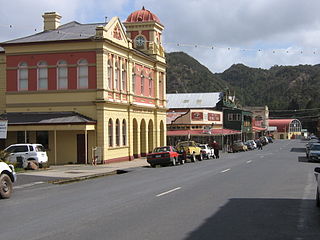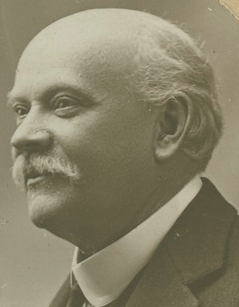Related Research Articles

Queenstown is a town in the West Coast region of the island of Tasmania, Australia. It is in a valley on the western slopes of Mount Owen on the West Coast Range.

Macquarie Harbour is a shallow fjord in the West Coast region of Tasmania, Australia. It is approximately 315 square kilometres (122 sq mi), and has an average depth of 15 metres (49 ft), with deeper places up to 50 metres (160 ft). It is navigable by shallow-draft vessels. The main channel is kept clear by the presence of a rock wall on the outside of the channel's curve. This man-made wall prevents erosion and keeps the channel deep and narrow, rather than allowing the channel to become wide and shallow. A reported Aboriginal name for the harbour is Parralaongatek.
Francis Eric Knight Britton was an American political scientist and sustainability activist who has lived and worked in Paris, France, since 1969. As the main convenor of The Commons: Open Society Sustainability Initiative and its various networks, he is well known for promoting integrated public transport, carsharing and bike sharing.

Eco-Schools is an international programme of the Foundation for Environmental Education (FEE) that aims to “empower students to be the change our sustainable world needs by engaging them in fun, action-orientated, and socially responsible learning.”

Angela Singer is an artist of British and New Zealand nationality who lives in Wellington, New Zealand. An animal rights activist, she addresses the way in which people exploit animals and the environment through the repurposing and remodelling of vintage taxidermy, a process she calls "de-taxidermy". Since the 1990s her work has been exhibited both in New Zealand and internationally.

Mark Diesendorf is an Australian academic and environmentalist, known for his work in sustainable development and renewable energy. He currently teaches environmental studies at the University of New South Wales, Australia. He was formerly professor of environmental science and founding director of the Institute for Sustainable Futures at the University of Technology, Sydney and before that a principal research scientist with CSIRO, where he was involved in early research on integrating wind power into electricity grids. His most recent book is Sustainable Energy Solutions for Climate Change.

Robert Carl Sticht was an American metallurgist and copper mine manager, active in Colorado and Montana, U.S.A. and in Tasmania, Australia. Sticht was the developer of the first successful purely pyritic smelting in the world. He was also an important book and art collector, a large part of whose collections were acquired by the Public Library of Victoria and the National Gallery of Victoria in the 1920s.

E. M. Sudarsana Natchiappan is a politician from Indian National Congress party and a Member of Parliament representing Tamil Nadu in the Rajya Sabha.

Taboo is a documentary television series that premiered in 2002 on the National Geographic Channel. The program is an educational look into "taboo" rituals and traditions practiced in some societies, yet forbidden and/or illegal in others.
The Murray–Darling Cap is a policy limiting irrigation diversions in the Murray–Darling Basin (Australia) to the volume of water that would have been diverted under 1993/94 levels of development. It seeks to strike a balance between the amount of water available to irrigators, the security of their water supply, and the environment. The Cap was introduced by the Murray–Darling Basin Ministerial Council in June 1995 after the release of the report titled "An Audit of Water Use in the Murray-Darling Basin".
Elisabeth Sanxay Holding (1889–1955) was an American novelist and short story writer. She primarily authored fiction in the hardboiled subgenre of detective novels.

Frederick Garnett Watson AM is an English-born astronomer and popular scientist in Australia. He holds the role of Australia's First Astronomer at Large within the Commonwealth Government of Australia, relaying the important aspects of Australian astronomy to the government, the general public, and associated organisations.
The Unconformity is an arts festival held in Queenstown, Tasmania in Australia.
Delta is a 1969 Australian TV series, produced and broadcast by ABC-TV in 1969-70. The title is the name of the fictional independent research organisation featured in the series, a freelance scientific consultancy which is called in to provide scientific investigators and troubleshooters in a wide range of situations, including pollution, forgery, mining, conservation, and the recovery of a lost satellite.

The contributions of women in climate change have received increasing attention in the early 21st century. Feedback from women and the issues faced by women have been described as "imperative" by the United Nations and "critical" by the Population Reference Bureau. A report by the World Health Organization concluded that incorporating gender-based analysis would "provide more effective climate change mitigation and adaptation."

Jan Maree Strugnell is an Australian evolutionary molecular biologist. She is a professor and director in the Centre for Sustainable Tropical Fisheries and Aquaculture at James Cook University, Townsville, Australia. Strugnell's work has investigated population and species level molecular evolution in Antarctic and deep sea species in the context of past geological and climatic change. Strugnell's work also uses genetic tools to help solve bottlenecks in aquaculture and fisheries industries.
Russell Mervyn Murray, commonly referred to as R. M. Murray, was general manager of the Mount Lyell Mining and Railway Co. Ltd, Queenstown, Tasmania for 22 years. Unusually for a mining man, his entire career of 44 years was spent at one location and for one company.
The School of the Environment at the University of Toronto is a trans-disciplinary academic unit that acts as a hub for the study of the environment, sustainability and climate change, offering undergraduate and graduate programs, along with joint programs with many disciplinary departments across the University. According to Maclean's Magazine, the School ranks second for environmental science programs in Canada. The School's research focusses on knowledge mobilization on a range of environmental issues, addressing questions of how to integrate scientific knowledge with local, community-based, and Indigenous knowledge to address global environmental crises such as Climate Change. The School is also home to many activist student groups advocating for environmental action.
References
- ↑ "ABC flagship radio shows axed". Land. Farm Online. 16 October 2008. Archived from the original on 6 July 2011. Retrieved 1 April 2011.
- ↑ "UTAS Alumni" . Retrieved 1 August 2012.
- ↑ Doyle, Timothy (2000). Green Power: The Environment Movement in Australia. Sydney: UNSW Press. p. xxxviii. ISBN 0868407143 . Retrieved 31 July 2012.
- ↑ "Earth Beat". Australian Broadcasting Corporation . Retrieved 1 August 2012.
- ↑ "The National Business Leaders Forum: Leading the Sustainability Business" . Retrieved 1 August 2012.
- ↑ "Antarctic Penguin Colonies Threatened by Changing Climate". Australian Broadcasting Corporation . 13 November 2010. Retrieved 1 August 2012.